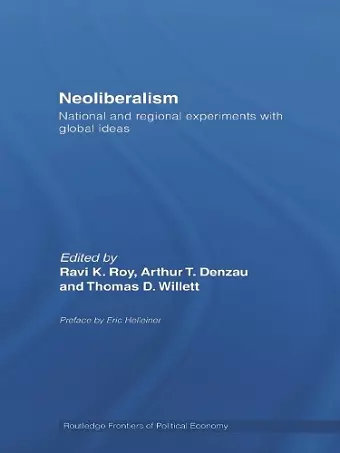Neoliberalism: National and Regional Experiments with Global Ideas
Arthur T Denzau editor Ravi K Roy editor Thomas D Willett editor
Format:Hardback
Publisher:Taylor & Francis Ltd
Published:7th Dec '06
Currently unavailable, our supplier has not provided us a restock date
This hardback is available in another edition too:
- Paperback£45.99(9780415458665)

Critics of globalization often portray neoliberalism as an extremist laissez-faire political-economic philosophy that rejects government any sort of government intervention in the domestic economy. Like most over-used terms, it is more complicated than this introductory sentence suggests. This volume seeks to move beyond these caricature depictions and definitions as well as the emotional rhetoric that has unfortunately dominated both the scholastic and political debate on neoliberalism and global market-oriented reform. This book emphasizes that there are in fact a variety of neoliberalisms that share a common emphasis on the role of the market. Beyond this however, its usages and applications appear much more varied according to the cultural, economic, political, and social context in which it is used.
A host of eminent contributors, including Douglass C. North, Arthur T. Denzau, Thomas D. Willett, Mark Blyth, Colin Hay, Craig Parsons, and others provide a rigorous assessment of the significance of neoliberal ideas on economic policy. Through their detailed international case studies the contributors to this book show how varied its impact has in fact been and the result is a book that will stimulate further debate in this most controversial of subject matters.
Ravi K. Roy is a Research Scholar at the Claremont Institute for Economic Policy Studies. Arthur T. Denzau is Professor of Economics at Claremont Graduate University. He is also a Research Associate at the Center for American Business at Washington University (St. Louis).Thomas D. Willett is Horton Professor of Economics at Claremont Graduate University. He is also Director of the Claremont Institute for Economic Policy Studies
Until recently, students of international political economy tended to discount the role of ideas in economic policy making. This impressive collection of essays breaks new ground in exploring how personal cognition, in the form of "shared mental models," can help shape perceptions of interest and policy choices. The focus is on the spread of "neo-liberal" market-oriented reforms around the globe in the 1980s and 1990s. The essays convincingly demonstrate that even when a common idea is shared, divergent social and political contexts can produce strikingly diverse outcomes. Political scientists and economists alike will learn much from the volume's insightful analysis.
-Benjamin J. Cohen
The book is divided into two parts, addressing conceptual analysis of shared mental models and neoliberalism and then turning to national and regional experiments with the ideas and practices of neoliberalism. I found both sections useful, though in different ways. The conceptual section, taking up topics such as macroeconomics, price changes, and the origins of neoliberalism, provides useful background. And then the country and regional studies provide a very comprehensive sample of the experience with neoliberalism, and some theories on why it has had more success in some nations rather than others.
By any standard, this is a very significant and ambitious book.
- Michael C. Munger, Public Choice
'Roy. Denzau, and Willett have assembled a broad and distinguished group of authors who try to apply, in the real-world context of “neoliberalism,” the North and Denzau “mental models” perspective. Individually, the chapters constitute illuminating case studies of not only the mental, but the political and institutional obstacles to reform. Collectively, they make a persuasive case for the importance of mental models-particularly, of our pictures about “how the world works”— in analyzing policy change.' Ronald Rogowski (Dean of the International Institute and a professor and former chair of Political Science at the University of California, Los Angeles, USA)
'Until recently, students of international political economy tended to discount the role of ideas in economic policy making. This impressive collection of essays breaks new ground in exploring how personal cognition, in the form of "shared mental models," can help shape perceptions of
interest and policy choices. The focus is on the spread of "neo-liberal" market-oriented reforms around the globe in the 1980s and 1990s. The essays convincingly demonstrate that even when a common idea is shared, divergent social and political contexts can produce strikingly diverse outcomes. Political scientists and economists alike will learn much from the volume's insightful analysis.' Benjamin J. Cohen (Louis G. Lancaster Professor of International Political Economy, University of California, Santa Barbara, USA)
'… the country and regional studies provide a very comprehensive sample of the experience with neoliberalism, and some theories on why it has had more success in some nations rather than others…By any standard, this is a very significant and ambitious book.' Michael Munger (Chairman, Department of Political Science, Duke University, USA)
ISBN: 9780415700900
Dimensions: unknown
Weight: 840g
368 pages